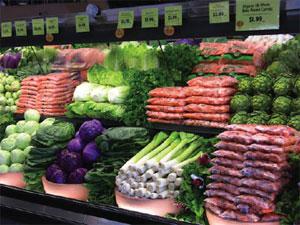PCC Natural Markets Raises the Bar

In Edmonds, Wash., at the Sept. 2 pre-opening party for PCC Natural Markets’ ninth store, over 3,000 curious members, vendors, and neighbors toured the co-op; their only disappointment was that they couldn’t shop that evening. At 9 a.m. the next morning, many area residents, with reusable shopping bags in hand, were lined up to watch Edmonds mayor Gary Haakenson cut the ceremonial ribbon, marking the official opening of the store. Aisles in every department were crowded with shopping carts throughout the day as shoppers explored PCC’s largest and most eco-friendly store.
Located in Snohomish County, Edmonds is a naturally beautiful community on Puget Sound, with stunning mountain vistas. Edmonds attracts young families, retired couples, and professionals who commute south to Seattle to or north to Everett. Well-educated, community-oriented, health-conscious, and environmentally passionate, Edmonds residents are much like many PCC shoppers elsewhere.
Anticipation for the new natural foods cooperative had grown since the November 2007 announcement that Edmonds would have a new PCC store. As word got out that PCC intended to transform an abandoned Albertsons store into the “greenest” grocery store in the country, the calls and emails multiplied.
This isn’t a new direction for the cooperative. According to Lori Ross, director of store development, “PCC has deliberately incorporated eco-friendly features in our remodel, upgrade and construction projects for many years. Conserving natural resources and lowering operating costs are important reasons, of course, but we also believe that our employees and shoppers deserve to work and shop in an environment as supportive of their health as the products we sell.”
PCC, which has over 45,000 member households, opened the first-ever LEED® Gold certified grocery store in Redmond, Wash. in May 2006. LEED (Leadership in Energy and Environmental Design) certification is achieved by meeting specific criteria developed by the U.S. Green Building Council. LEED certification for a grocery store, which is essentially a large, energy-consuming refrigerator, is challenging enough when the store is built from the ground up, as was the Redmond PCC. The co-op’s Edmonds location was a renovation project, working with an existing building.
From initial design, throughout construction, and in operating the store, priority was and is still given to environmentally responsible procedures and features that maximize resource efficiency and minimize waste. The sales area receives natural light from 35 skylights specially glazed to block out 64 percent of the sun’s heat while letting in 65 percent of visible light. Full spectrum lighting is achieved through a combination of ceramic metal halide and fluorescent lights. LED lights installed in the dairy and freezer doors require one-fourth the electricity drawn by fluorescent lights, generate less heat than incandescent bulbs, and last far longer than either. When the store is closed, timers turn off accent lighting in the sales area.
Space heating, hot water heating, and refrigeration systems are interconnected by the same refrigerant loop, so waste heat from the refrigeration system is utilized by the other functions. Energy Star-rated appliances are used throughout the store, and all energy-consuming systems have sensors that measure actual usage.
Waste management was a top priority in constructing the new store. In removing wood, metal and drywall from the site, 97 percent of the 109 tons was recycled. Two truckloads of clean insulation were sent to the United Way for use in rebuilding homes and businesses destroyed by area flooding in December 2007.
Recycled materials were used throughout the store. Custom cabinets were built of panels made from a 100 percent recycled fiber. Countertops in the offices are made from 60 percent recycled paper and environmentally friendly water-based resins. Tables in the store’s state-of-the-art teaching classroom, where shoppers are offered food preparation and wellness classes, are made from renewable bamboo plywood. Wall tiles handmade from recycled clay or glass were used throughout the store, and plumbing and refrigeration piping was made from recycled copper.
Features unique to the Edmonds location are two rain gardens in the parking lot and a rainwater harvesting system. Water runoff containing oil and sediments from the parking areas is filtered through plants, amended soil, and beach pebble layers, cleaning the water before it drains to the water table below. Rainwater collection includes the store roof, an adjacent 4,500-gallon tank, and a simple system of water pipes and filters. A pressure pump pulls rainwater stored in the tank through a series of increasingly finer filters, delivering water to flush the store’s low-flow toilets and to irrigate landscaping around the parking lot.
At 25,252 square feet, the Edmonds PCC is the co-op’s largest store, employing 140 full- and part-time staff. Space allocation by department is similar to that of its other 20,000-plus-square-foot stores in Seattle neighborhoods. The deli, which features hot food, soup, sushi, pizza, and gelato, as well as baked goods and prepared foods, occupies 19 percent of the store yet contributes 26 percent to total sales. Space allocation for other departments includes produce at 13 percent and meat and seafood at 5 percent. The grocery department, inclusive of a wide variety of bulk items, occupies 22 percent of the store and accounts for 38 percent of total sales. An in-store commissary, where dough for baked products is prepared and frozen for finishing at PCC’s other stores, takes up another 5 percent, as does the health and beauty department.
The work, planning, and attention applied to each construction and customer service detail have paid off. Within the first two weeks of operation, more than 2,500 new members joined PCC, even though membership is not required to shop. Weekly sales seem to be stabilizing at well over $300,000. Comments posted to PCC’s website by store visitors have been overwhelmingly positive, and reviews in the local press and in blogs written by area food writers have praised the store’s special features, service, and product offerings.
Diana Crane is director of sustainability at PCC Natural Markets in Seattle (Diana.Crane@pccsea.com).







